What the hELL she doin’
14th June 2021This work is part of the performingborders 2021 commission Recipes for Autonomy by Syowia Kyambi.
“What the hELL she doin!” is a collective of four female-identifying artists from across the African continent and its Diasporas. Common to our respective practices are touchstones, which include but are not limited to: the body and what gets embodied, remembering and dismembering, standing and leaving, invisible creolization, and labor as geography.
Collectively we use “things” from our own black and brown domestic spheres; not to examine the notion of home, instead, we use the materiality of our domestic in paradigm-namic ways to explain the rest of the world. A colossal reversal of knowledge and meta-text production that is commonly understood as happening outside of the domestic sphere. “What the hell…” is what we most often hear whilst doing.
Our aim as an enduring and powerful collective is to shift narratives and impact critical situations commonly long thought of as not being critical. Our objective is to gather theorists, writers and other artists to objectively contextualize our endeavors and shift discourses to a deeper level. As a collective, we look forward to more agency, stamina, and meaningful impact. We wish to thrive in an art world cannon where cross Atlantic, cross-diasporic voices can be experienced with a whole earth view devoid of marginalization.
We have compiled a booklet for Self-care and autonomy. You will find some advice, take it or leave it no harm no foul. This is intended to help for those times when you’re navigating the sea of shit in which we sometimes sadly more than often find ourselves in.
Please note this advice comes from our varied experiences as artists, art educators, curators, cultural producers and our lived experience as women of colour.
Sonia E Barrett’s advice for artists:
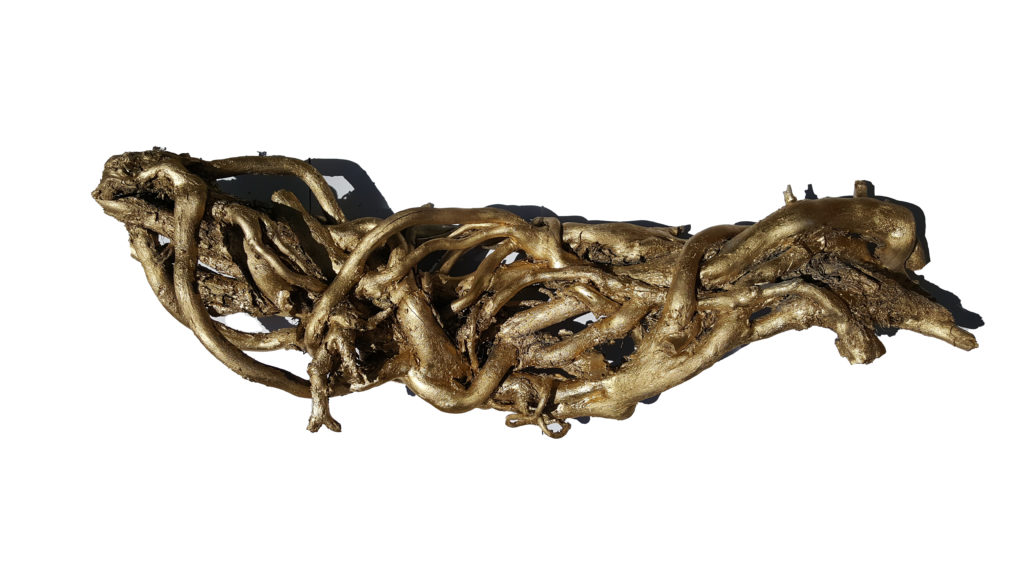
These are the things I am still learning to do today wherever I work be it the Caribbean, The African Continent or Europe.
These are the things that should perhaps always be a stretch and that is ok
From an embodied practice:
Being a black female artist comes with a number of burdens but you don’t have to manifest them in that way. I think Rinproche is helpful:
“Even if you have a lot of work to do, if you think of it as wonderful, and if you feel it as wonderful, it will transform into the energy of joy and fire, instead of becoming a burden.”
– Tulku Thondup Rinpoche
If you cannot think it as wonderful, (and I often fail at this) then practice
self-care like your life depends on it. (It might your artistic life at least maybe even your life-life) (and I often fail at this too)
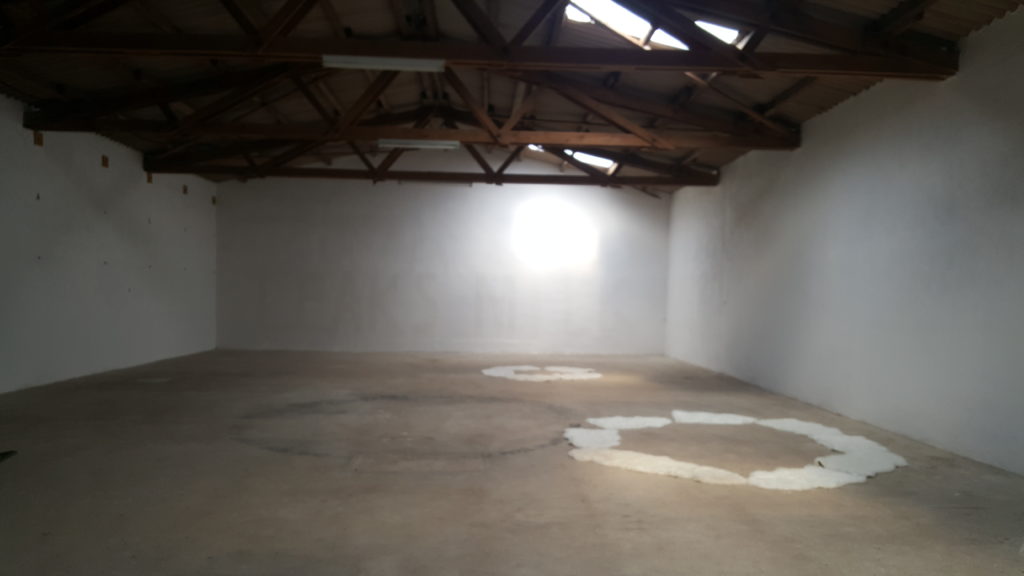
Do whatever it takes to claim space, more than you think you need, then share it. Holding the space even when people cannot show up this time is also the work, honor that. Don’t hold yourself to prevailing standards of instituting, don’t focus on funding focus on people, what you already have what you can already give. Others will see it can be done and will institute too. In this way your efforts will be doubled and redoubled in ways you cannot imagine.
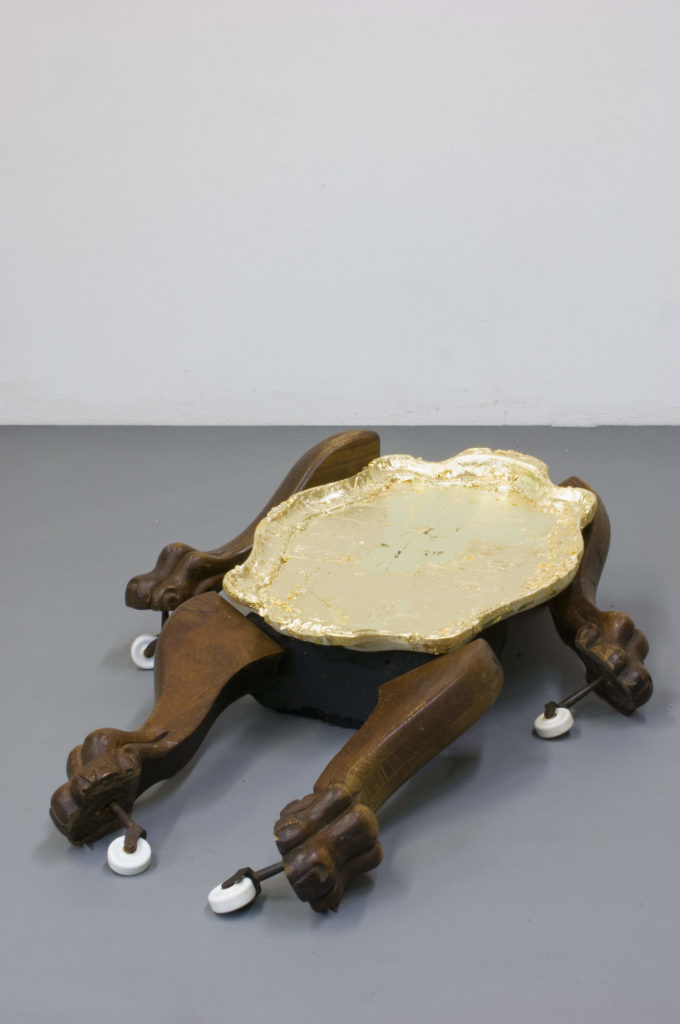
From my practice of performing furniture to look beyond objectification:
Don’t be afraid to look foolish, in my practice of listening to chairs I know I appeared to be “unhinged” but it was
coming from a place of pure love and deep listening and so I trusted it. Trust the impulses that come from your internal deep spaces that may not make sense in the external spaces you are in; those external spaces might not be
intended for you anyhow.
(Left) Table Nr. 8, Sonia E. Barrett
Gold leaf tray, ceramic furniture wheels, styrofoam, wood table legs 30 x 60 x 160cm, 2012
My experience and response as a female artist of colour: Usha Seejarim
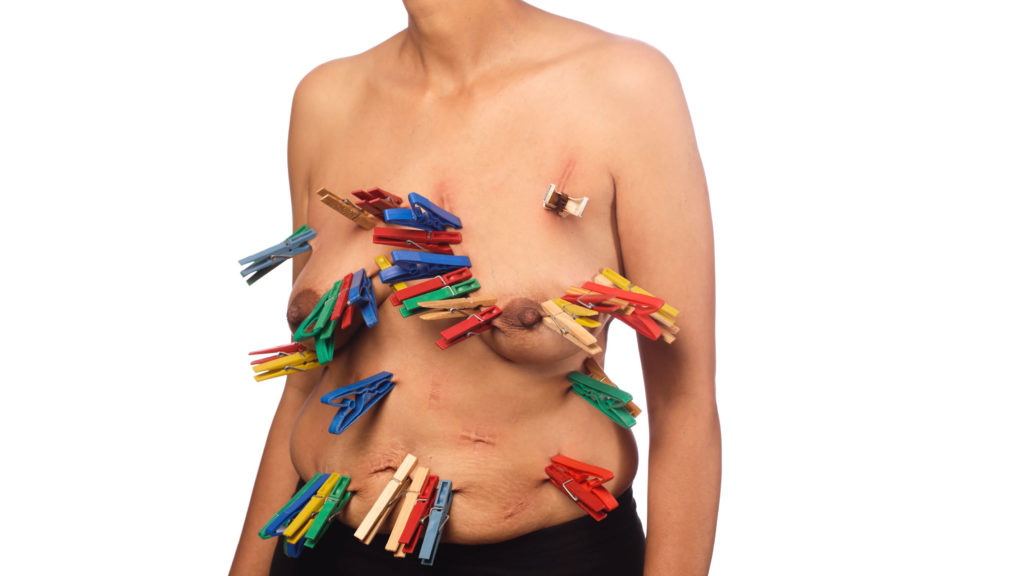
- Live your truth. Be authentic and trust your own voice, even if it goes against the grain at the time. Working with integrity stands for more than you realize.
- Endure. Stay with it. Push, pull and challenge the status quo. There is something to be said of Staying Power….
Keep moving, and build the momentum. - Having just advised to build momentum, it is equally important to be still, be quiet and connect within.
- For a long time, I spoke with a small voice. I have learned to trust my position and build the confidence to speak up, to express myself and to point out the hypocrisies and contradictions. I have learned that when this voice is concise and expressed from a place of clarity, growth, equality maybe even criticism, it will be heard loudly.
- Find the balance of being selfless and practice self-care. Give, share, love and teach others but also know when to look after yourself.
- Acknowledge your Creative Capital. The fact that you do so many diverse things should not be a problem; it is an asset. And all these separate and distinct skills and expertise contribute to who you are. Embrace them and let your unique magic shine through your multi-faceted self.
- Be proactive; set the agenda, drive the conversation, claim your power and direct your own course.
- Question, be critical, challenge………and then act on it!
- Do what it takes to get into “the zone” of creating. Work from a studio, give yourself time to work, to play, suspend judgement until the work is more developed, enjoy being alone and fall in love with your own work.
Advice from Immy Mali:
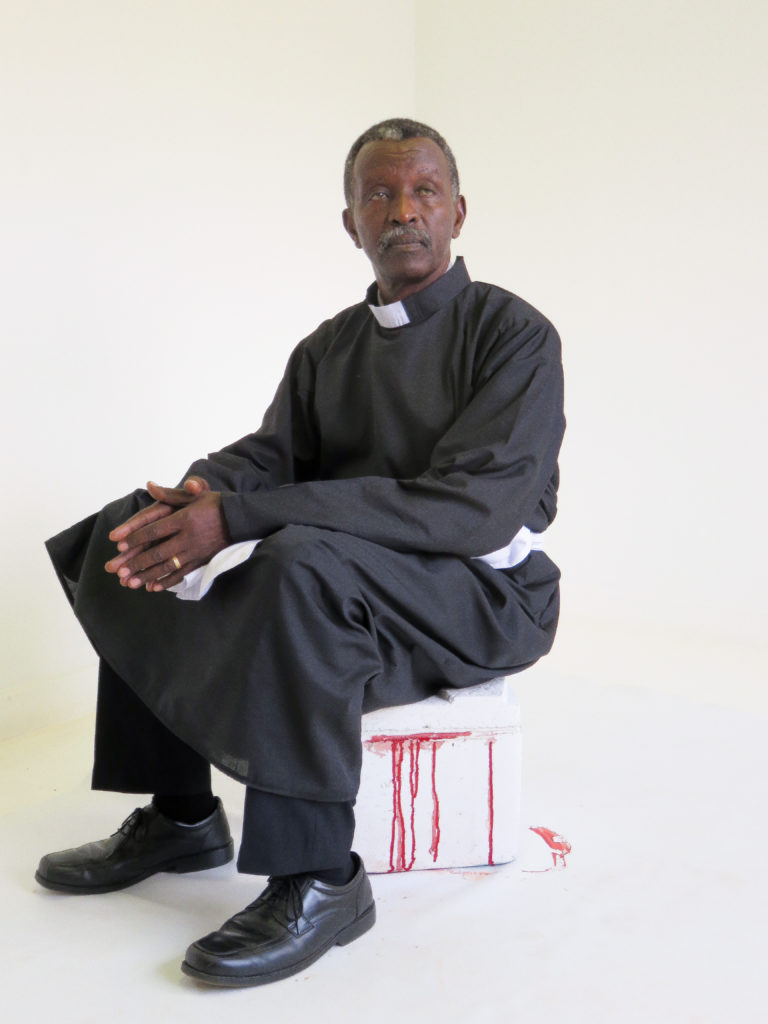
Video Still, Blood, Paper Stool & Performance, 28.4 x 28.4 x 29.8cm, Performance duration variable 1hr – 3hrs, 2016
- Make sure you understand all the gibberish in the contract before you agree to them.
- Have dinner with a random family if you go to a place; it always reveals weird things and interesting things. It
doesn’t really have to be a family it can just be people you’ve met there. - Be spontaneous!
10 points to remember, use, re-remind yourself to use – Syowia Kyambi
- Get it in writing, even when it was a phone call, write an email with an update on what was discussed
- Infiltrate and constipate
- Professionalize yourself, raise your own standard, and don’t assume that the institution is professional
- Discomfort is your best friend. Sit inside of discomfort
- Don’t ask don’t get
- Develop your autonomy. Practice it. Start by asking whose trajectory are you role-playing in? Then look at the nuances then it’s time for navigation to the place you want to be in.
- On my studio wall I once wrote, get the tools you need to navigate the sea of shit
- Be conscious of the language you use, make it deliberate, define your own as needed
- Surround yourself with positive people; mix up your peer group
- Audience is fluid
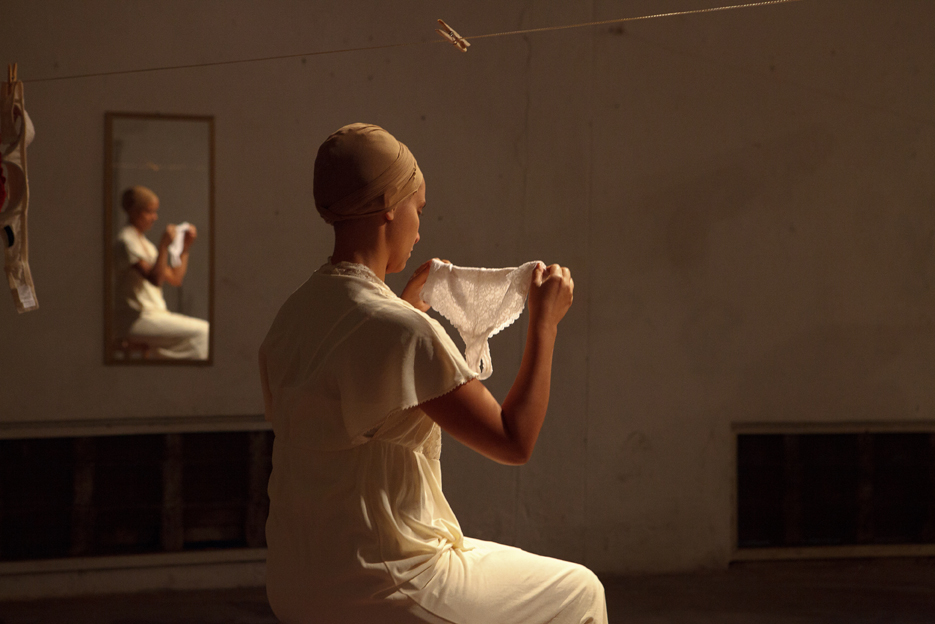
Video Still, Installation Performance, Duration 2hr -30min, GoDown Art Centre, Kenya, 2014
Thanks for your time. Good luck with creating, building upon your self care practice and autonomy!
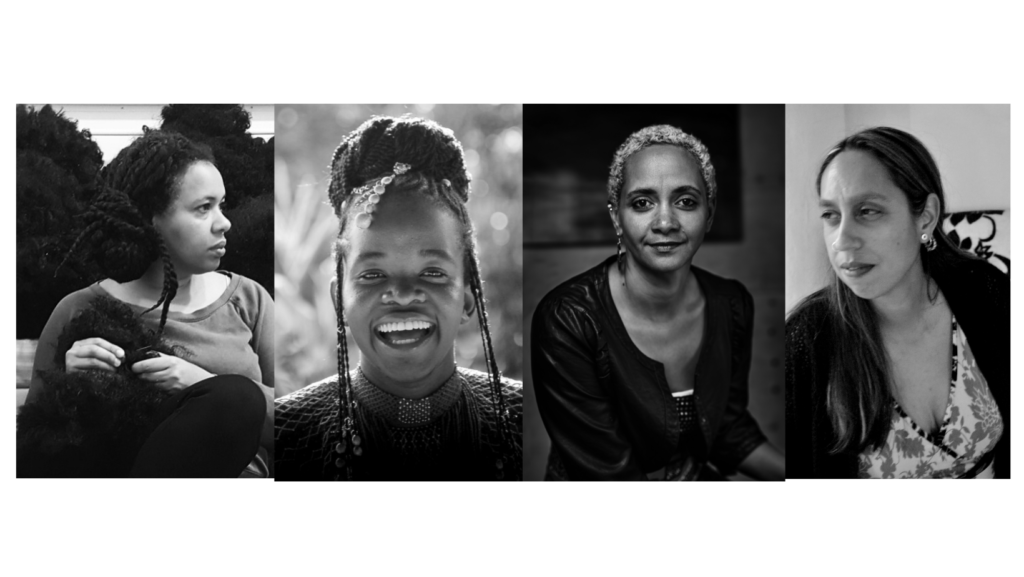
Sonia Barret Of German Jamaican Parentage brought up in England, China and Cyprus, Sonia Elizabeth Barrett is a graduate of St Andrews University graduating with an MA in literature and the Transart Institute with an MFA in Studio Practice. Sonia is a MacDowell fellow and recipient of the Boss Harlan Foundation stipend and has been recognised by the Premio Ora prize, NY Art Slant showcase for sculpture and the Neo Art Prize. She has exhibited by the Museum for the Sea Italy, the National Gallery of Jamaica, and the Heinrich Böll Institute Germany. Her work has been shown at a number of galleries including the OCCCA California, the NGBK Berlin, The Format Contemporary in Milan and the Rosenwald Wolf Gallery Philadelphia the Museum of Derby and the British Library. Her works have been published in the International Review of African American Art, Black History 365 Journal, Kunstforum International, the Contemporary & Platform, ELSE Journal and Protocollum. In 2017 she initiated AIPCC in Bavaria, a peripheral space centering and facilitating peripheral arts practitioners. @soniaelizabethbarret
Anderu Immaculate Mali a.k.a Immy Mali. Immy from Arua, lives and works in Kampala Uganda. Using a variety of media including, text, video, sound, sculpture, installation, animation, her work attempts to unpack the complexities and entanglements of memory and existence in a neo/postcolonial Uganda. Notions of presence and absence, personal memories of childhood growing up in Uganda juxtaposed with current personal and collective
experiences of existence in shifting spaces also influence her work. Her ongoing project Letters to my childhood (2017-present) accords her the duality to engage with her past and present simultaneously. In 2013, she obtained a Bachelors degree in Industrial and Fine Arts from Margaret Trowell School of Industrial and Fine arts, Makerere University, Kampala. She is an alumnus of the Rijksakademie van Beeldende Kunsten in Amsterdam, Netherlands
(2018-2019). Mali has participated in exhibitions, residencies and workshops in various countries including Kenya, Netherlands, India, Ethiopia, Denmark, Germany, USA, South Africa, Mozambique, Angola, and Uganda. Her work has been published in art magazines including the Africa arts journal 2019. @immymali
Syowia Kyambi (b. Nairobi) is an interdisciplinary artist and curator who works across photography, video, drawing, sound, sculpture and performance installation. She holds an MFA from Transart Institute (2020) and a BFA from the School of the Art Institute of Chicago (2002). She is based in Nairobi and is of Kenyan/German origin. In Kyambi’s artistic practice history collapses into the contemporary through the interventions of mischievous and disruptive interlocutory agents who interrogate the legacy of hurt inflicted by colonial projects that still frame the wider political conjuncture of now. The work is complex, messy and uneasy. It requires its viewers and participants to bear witness to an embodiment of collective experiences, and the constant search for links between the now and the morphed now that is encapsulated in her work asks important questions about what is remembered, what is archived, and how we see the world anew. Rooted in her practice is a deep connection with the land, the earth and the idea of home. By working to eloquently blend the disparate concepts and elements she contends with through her process while avoiding excessive constraints or directing of the viewer, her audiences and participants watch and experience these ingredients react, interact and metamorphose.
Along with exhibiting her works throughout Europe, Africa and the United States, (in museums and galleries in Senegal, Belgium, Finland, Kenya, Mali, Sweden, Germany, Zimbabwe, France, Norway, United Kingdom, Mexico, South Africa, North America and Ireland.) Kyambi has received a number of awards and short-listings including the FT/Oppenheimer Funds Emerging Voices Awards (2016) and the UNESCO Prize for the Promotion of the Arts Award (2004). Artist residencies include PRAKSIS, Norway (2019), CAD+SR Italy & Mexico (2018), HIAP, Finland (2018), IASPIS, Sweden (2013), and Delfina Foundation, UK (2016). In her curatorial work, she has collaborated with Ostrale Centre for Contemporary Art Biennale, Dresden, Germany (2019, 2016) and Goethe-Institute, Kenya (2012, 2010) as well as working with collectives and individual artists in East Africa. Her work is held in a number of private and public collections including the Robert Devereux Collection, London, the Kouvola Art Museum Collection, Finland, the National Museum of Kenya and the Sindika Dokolo Foundation. syowiakyambi.com
Usha Seejarim is best known for her reinterpretation of ordinary and domestic objects. Making use of common materials such as safety pins, wooden pegs, irons and brooms, her work has a distinctly Dadaist influence. Her compositions result from repetitive acts of mark making alluding to themes related to time, chance, space and displacement. Usha Seejarim was born in 1974 in Bethal, South Africa. Seejarim received a B-Tech Degree in Fine Art from the University of Johannesburg in 1999 and a Master’s Degree in Fine Art at the University of The Witwatersrand (WITS) in 2008, both in Johannesburg, South Africa, where she currently lives and works. @ushaseejarim
This commission is a part of the performingborders 2021 programme, supported by Arts Council England. The full commission by Syowia Kyambi can be seen here: Recipes for Autonomy
Images courtesy of Syowia Kyambi and What the hELL she doin’